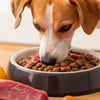Why Has My Dog Stopped Eating Kibble? Understanding the Reasons Behind Changes in Appetite
- Houndsy
Table of Contents
- Introduction
- Understanding Canine Nutrition
- Common Reasons Why Dogs Stop Eating Kibble
- What to Do If Your Dog Stops Eating Kibble
- Conclusion
Introduction
As devoted pet owners, we often find ourselves puzzled when our furry companions suddenly refuse to eat their kibble. Did you know that approximately 20% of dogs will experience a change in appetite at some point in their lives? It’s a startling statistic that underscores how common this issue is among our beloved pets. But why does this happen? Is it a simple case of pickiness, or could it be something more serious?
In this blog post, we will explore the myriad reasons why dogs may stop eating their kibble, including health concerns, behavioral factors, and dietary preferences. We aim to equip you with the knowledge you need to navigate this puzzling situation, ensuring that your dog remains healthy and happy. By the end of this article, you will understand the potential causes of your dog’s sudden change in eating habits and how to address them, while also considering alternatives like our Houndsy Kibble Dispenser to enhance your dog's feeding experience.
Let’s dive deep into the world of canine nutrition and discover how we can support our furry friends in their dietary journeys.
Understanding Canine Nutrition
Before we unravel the reasons behind your dog's disinterest in kibble, it’s essential to grasp the basics of canine nutrition. Dogs are omnivores, which means they can thrive on a variety of foods, including both animal and plant-based ingredients. The primary goal of any dog's diet is to provide them with the essential nutrients they need to maintain their health and vitality.
Key Nutrients for Dogs
- Proteins: Vital for muscle development and repair.
- Fats: Essential for energy and skin health.
- Carbohydrates: Provide energy and support digestive health.
- Vitamins and Minerals: Important for various bodily functions, including immune support and bone health.
Understanding these components helps us appreciate why a sudden change in diet—like a refusal to eat kibble—can be concerning. Dogs need a balanced diet to flourish, and any disruption can affect their overall well-being.
Common Reasons Why Dogs Stop Eating Kibble
Now, let's explore the various factors that might lead your dog to turn its nose up at its kibble.
1. Health Issues
Gastrointestinal Problems
One of the most common reasons for a sudden lack of appetite in dogs is gastrointestinal distress. Conditions such as gastritis, pancreatitis, or even infections can make eating painful or unappealing. If your dog shows additional symptoms like vomiting, diarrhea, or lethargy, it's vital to consult your veterinarian.
Dental Problems
Dental disease is another significant factor. Conditions like periodontal disease or broken teeth can make chewing kibble uncomfortable. If you notice your dog favoring soft food or avoiding chewing altogether, a dental check-up may be necessary.
Other Medical Conditions
Various health issues can lead to decreased appetite, including:
- Kidney disease
- Liver dysfunction
- Cancer
- Endocrine disorders
If your dog has suddenly stopped eating and exhibits other concerning behaviors, a veterinary visit is crucial to rule out any serious health problems.
2. Behavioral Factors
Stress and Anxiety
Dogs can experience stress just like humans. Changes in their environment, such as moving homes, the arrival of a new pet, or even loud noises (like fireworks), can lead to anxiety that affects their eating habits. Observing your dog's behavior can provide clues; if they seem anxious or restless, consider creating a calming space for them during mealtimes.
Picky Eating
Just like humans, some dogs can be particular about their food. If your dog has always been a kibble lover but suddenly turns its nose up, they may simply be bored of the same flavor or texture. Dogs can also develop preferences based on their experiences with different types of food.
3. Food Quality and Freshness
Expired or Spoiled Food
Sometimes, the simplest explanation is that the kibble is no longer fresh. Check the expiration date and store your dog's food properly to maintain its quality. If the kibble smells off or has an unusual texture, it may not be palatable to your dog.
Nutritional Imbalance
Not all kibble is created equal. Some brands may not provide adequate nutrition or may include fillers that are unappealing to dogs. If you suspect your dog's food isn't meeting their needs, consider consulting your vet for recommendations on better-quality options.
4. Changes in Routine
Dogs thrive on routine, and any disruption can impact their appetite. If you’ve altered their feeding schedule or daily routine, they might react by refusing to eat. Maintaining a consistent feeding time can help reassure your dog and encourage them to eat.
What to Do If Your Dog Stops Eating Kibble
If you find yourself in a situation where your dog is refusing its kibble, here are some steps you can take:
1. Monitor Their Health
Keep a close eye on your dog's overall health and behavior. Note any other symptoms such as vomiting, diarrhea, or lethargy. If these issues persist for more than a day, it's time to contact your veterinarian.
2. Consider Food Alternatives
If your dog is being picky, it may be time to explore alternatives. Here are some options to consider:
- Add Toppers: Enhance kibble with flavors your dog loves, such as unsweetened canned pumpkin, plain yogurt, or bone broth.
- Try Different Textures: Mixing kibble with wet food can make mealtime more interesting.
- Fresh Dog Food: Consider transitioning to fresh, human-grade dog food options that are tailored to your dog's nutritional needs.
3. Ensure Comfortable Feeding Conditions
Make sure your dog has a calm, comfortable space to eat. Use a non-slip mat under their bowl and try a raised feeding station if they have mobility issues.
4. Invest in Quality Products
At Houndsy, we believe that feeding should be a delightful experience for both you and your dog. Our flagship Houndsy Kibble Dispenser not only offers convenience but also maintains the freshness of your dog's kibble. With its sleek mid-century modern design, it fits beautifully into your home while providing perfect portion control. Explore the Houndsy Kibble Dispenser for a stylish and functional feeding solution.
Conclusion
Understanding why your dog has stopped eating kibble can be a complex issue that involves various health and behavioral factors. By closely monitoring your dog's health, considering dietary alternatives, and ensuring a comfortable feeding environment, you can help restore their appetite.
As responsible pet owners, it's our duty to remain vigilant about our dogs' eating habits and overall well-being. If your dog continues to refuse kibble or shows any signs of illness, don't hesitate to reach out to your veterinarian. And remember, enhancing the feeding experience doesn’t have to be a chore; with solutions like the Houndsy Kibble Dispenser, we can create a beautiful and functional space for our furry friends to enjoy their meals.
FAQ
Q1: How long can a dog go without eating?
A: Generally, a dog can go three to five days without food, but it's crucial to contact your veterinarian if your dog hasn't eaten for more than 24 hours, especially if they are showing other signs of illness.
Q2: Should I force my dog to eat if they refuse?
A: No, forcing your dog to eat can create a negative association with mealtime. Instead, try to make their food more appealing or consult your vet for advice.
Q3: What can I add to my dog's kibble to entice them to eat?
A: Consider adding bone broth, plain yogurt, or a bit of cooked chicken or vegetables. Just ensure any additions are safe for your dog's diet.
Q4: When should I call my vet about my dog's eating habits?
A: If your dog has stopped eating for more than a day, shows signs of distress or illness, or has significant behavioral changes, it's best to consult your veterinarian.
Q5: Can I switch my dog's food suddenly?
A: It's best to transition gradually to avoid stomach upset. Mix the new food with the old food over several days to help your dog adjust.
By understanding the nuances of canine nutrition and being proactive about our dogs' health, we can ensure they enjoy a long, happy, and healthy life.













